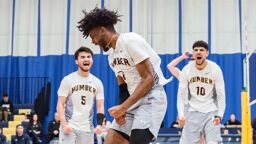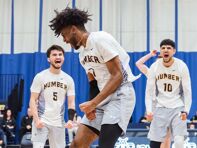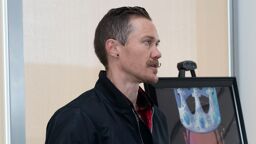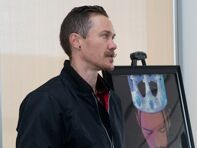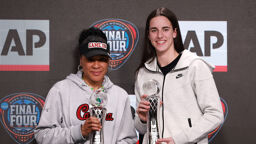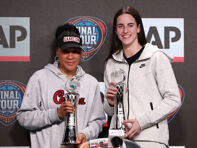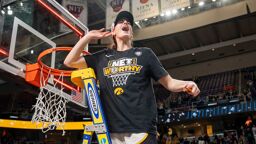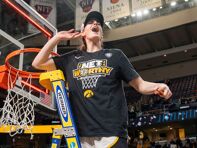Many important conversations around LGBTQ identity have happened in Indiana and across the country in the last week, but as the Final Four approaches and college athletics again takes the national center stage, a recent conversation on Purdue University's campus brought timely notice to the impacts of discrimination – and the benefits on inclusion – in sports.
On March 30, 2015, Purdue University hosted "Championing Equality: LGBTQ Athletes and Allies" to explore serious conversations around improving the experiences of LGBTQ student athletes. This collaborative program brought together current and former student athletes, athletics staff, LGBTQ Center professionals, student leaders, noted scholars, and the broader campus community for an engaging and deeply informative evening.
Former Purdue swimmer Ryan Dafforn, who came out as gay during his senior year, worked closely with the Purdue LGBTQ Center on the event.
"Being a former athlete at Purdue and being closeted seven out of the eight semesters I was there, I felt it was extremely important to have this event at Purdue to bring more awareness and visibility to some of the struggles out and closeted athletes and coaches may be experiencing on Purdue's campus or perhaps even around the state of Indiana," Dafforn said. "Because I am passionate and want to contribute to the continued success of my alma mater, I thought this would be a great way to help build on that foundation of success and tight-knit community that is the Purdue Athletics family."
Morgan Burke, Purdue's Vice President and Director of Intercollegiate Athletics, supported that idea of family in his opening remarks. As an outsider, I could feel the crowd as he closed with, "Boiler up, hammer down, hail Purdue!" It was like giant team huddle breaking before heading out on the court – a fitting way to kick off the night.
The evening's keynote speaker – Dr. Sue Rankin – shared national data indicating that LGBTQ students continue to perceive high rates of anti-LGBTQ language and behaviors on college campuses that inhibit the ability of many to come out, connect to critical resources, and ultimately thrive.
Stephanie White, Head Coach of the Indiana Fever and Purdue alumna, delivered a moving speech via video about her experience of coming to understand her identity. She again stressed the importance of creating spaces where athletes can thrive, and where coaches and fans feel welcomed.
It seemed clear that Purdue is leading the way in this area, as current Purdue women's basketball player Bree Horrocks made history as the first openly gay athlete in a revenue sport at Purdue when she announced her identity on the panel. The confidence with which she delivered this news was matter-of-fact; it is who she knows herself to be. Horrocks, a freshman on the Purdue team, openly shared her experience as a current out student athlete, while Dafforn and former Purdue football player Dorien Bryant shared impressions from a few years prior. In their time, Bryant and Dafforn said conversations like this one were not happening.
"Seeing this event come to fruition and take place was truly something I never really even thought was something possible during my time as a student athlete," Dafforn said. "The amount of leadership and commitment Purdue Athletics and Purdue University has made to creating inclusive and welcoming environments in athletics is trailblazing and makes me extremely proud. It goes to show that with open lines of communication and collaboration, bringing events like this to college campuses isn't just something that can be done at Purdue, but that can be replicated for colleges and universities nationwide to help further this important discussion."
Panelists – myself included as the Executive Director of GO! Athletes and founder of TransAthlete.com – shared experiences of coming out and navigating support, challenges, and finding allies along the way. Dafforn found support from his coaches and teammates during his time as an out swimmer, and Horrocks said she feels open to be fully herself on her team as well.
The event ended with powerful closing remarks that encouraged the audience to continue the conversation after leaving the room, and challenged them to interrupt discriminatory behavior in the locker rooms, on the court, and across campus when they see it.
What happened on Purdue's campus on Monday was nothing short of amazing. Some of the most meaningful moments of the night for me came through seeing Purdue administration engage in the front of the room as the other panelists shared their experiences as student athletes. Dafforn expected the warm reception based on his experiences.
"Purdue has a strong commitment to inclusion and respect for all athletes, coaches administrators and fans," Dafforn said. "This event was a great opportunity to discuss very important and relevant matters and messages that attendees were able to take and learn from our event."
Lowell Kane, Director of the Purdue LGBTQ Center, hopes this event will be first of many of its kind.
"While many universities have implemented programs and initiatives designed to improve campus climate for diversity overall, the current state of affairs for LGBTQ students nationwide requires us to pay attention to the challenging data, uncomfortable realities, often limited resources, and difficult truths," Kane said. "We sincerely hope that this event will inspire peer institutions to engage in critical discussions around LGBTQ inclusion in athletics and beyond. At Purdue, we've started the conversation – but we certainly haven't finished it."
"Championing Equality: LGBTQ Athletes and Allies" was produced by the Purdue LGBTQ Center and with the support of Purdue Athletics, the Black Cultural Center, Purdue 360, Purdue Student Government, Campus Pride, NCAA, and GO! Athletes.








